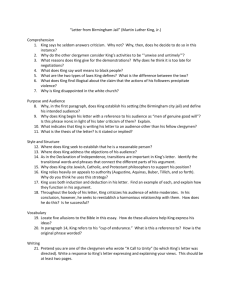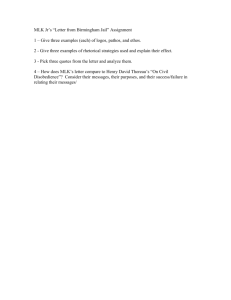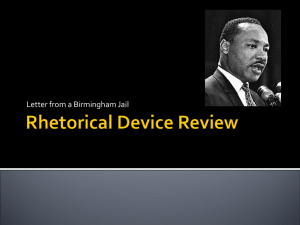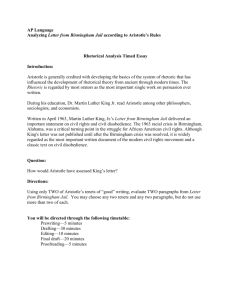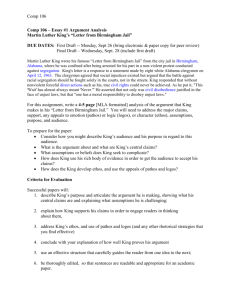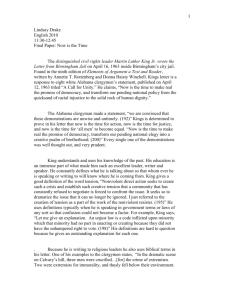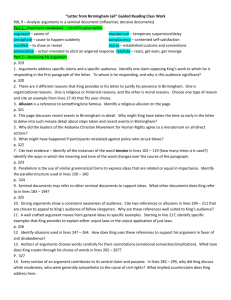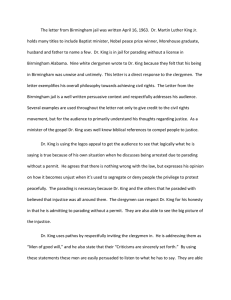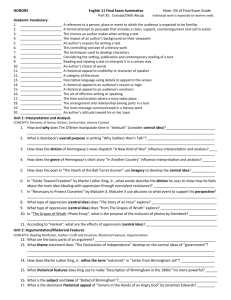Rhetorical Analysis: Letter from Birmingham Jail
advertisement
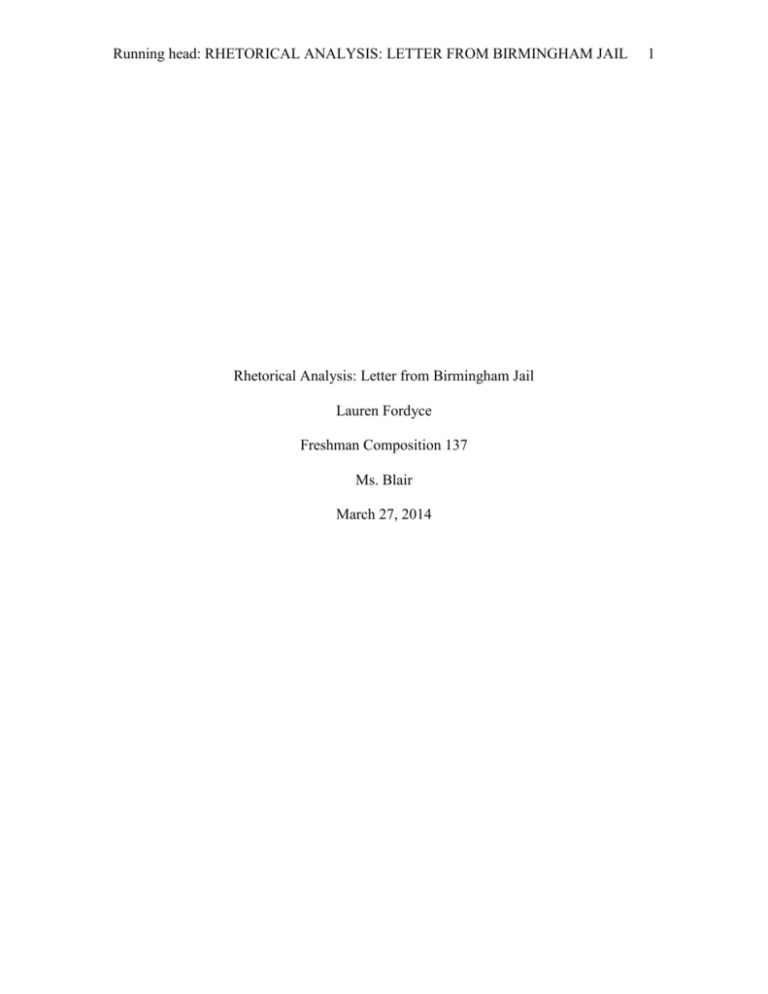
Running head: RHETORICAL ANALYSIS: LETTER FROM BIRMINGHAM JAIL Rhetorical Analysis: Letter from Birmingham Jail Lauren Fordyce Freshman Composition 137 Ms. Blair March 27, 2014 1 Running head: RHETORICAL ANALYSIS: LETTER FROM BIRMINGHAM JAIL 2 Rhetorical Analysis: Letter from Birmingham Jail In 1963 inmate Martin Luther King Jr., confined in a Birmingham Alabama city cell. Many clergymen considered King’s activities as “unwise and untimely”. It was very rare that King even responded to the statements made about his actions or words, but King felt empowered to respond to these statements. Dr. King used several argument strategies to construct Letter from Birmingham Jail. This letter reached out to not only the clergymen but to the world to explain his actions, and verify that what he did was indeed necessary and perfect timing. Birmingham at this time was a very corrupt place and the sight of many adversities. In the letter, king explained that it was his duty to be in the city. He and many others wanted to resolve these odds, and achieve this by nonviolent action. This included sit ins, protest, marches and speeches for everyone to hear. This was setup by the Southern Christian Leadership Conference. This organization was setup in every southern state. Although peaceful, others were arrested for picketing, marching and boycotting. Many of these activists like King, just wanted to make a change for their people. King used several types of appeals and argument to prove his side of the story in the letter. To make an appeal to an audience, one usually uses logical appeal or logos. “The answer lies in the fact that there are two types of laws: just and unjust (p.448).” He grabs the reader’s attention with a fact. One may confuse this statement with a fallacy, but the statement is a truthful logic. This form of logic states facts that support a theory Running head: RHETORICAL ANALYSIS: LETTER FROM BIRMINGHAM JAIL 3 and can be an eye opener to someone after reading. Such as the story on Adolf Hitler. “We should never forget that everything Adolf Hitler did in Germany was "legal" and everything the Hungarian freedom fighters did in Hungary was "illegal." It was "illegal" to aid and comfort a Jew in Hitler's Germany. Just because Hitler was supremacy, everything that he did was not necessarily something good for his people. “Even so, I am sure that, had I lived in Germany at the time, I would have aided and comforted my Jewish brothers.”” If today I lived in a Communist country where certain principles dear to the Christian faith are suppressed, I would openly advocate disobeying that country's antireligious laws.” King meant that he would do anything for his brothers and sisters. He kept to his word and his character would never change. For his fellow men to have switched sides on him and their brothers, shows a change of character. He also uses emotional appeal by persuading readers through their emotions (pathos). King uses this appeal to try and get readers to vividly see where he is and how he feels in the place he is at. His first sentence in the beginning of the letter, he makes the reader feel sympathy for him, because he says “While confined here in the Birmingham city jail, I came across your recent statement calling my present activities "unwise and untimely." He allows the readers to see what conditions he is living in and how much free time he had to permit him to read the letters. It also proved how he felt for what they said about him in the letter. Pathos is a way for someone to effectively show how an author feels. , “Perhaps it is easy for those who have never felt the stinging darts of segregation to say, "Wait." But when you have seen vicious mobs lynch your mothers and fathers at will and drown your sisters and brothers at whim; when you have seen hate filled policemen curse, kick and even kill your black brothers and sisters; when you see the vast Running head: RHETORICAL ANALYSIS: LETTER FROM BIRMINGHAM JAIL 4 majority of your twenty million Negro brothers smothering in an airtight cage of poverty in the midst of an affluent society (p. 448).” He expressed that these people mean so much to him and provides many of the reasoning that the clergymen questioned throughout the letter. Which was very helpful in appealing to the readers sense of emotion. The beginning of the letter starts King Addressing those who commented on his actions. “My Dear Fellow Clergymen”, was his first approach. This is a use of ethos. (pg.445)Ethos is a ethical appeal, providing background or the character of a individual. This tactic was useful in throughout the paper and first identified with his first sentence. He said fellow clergymen to identify that they were once in the same situation as him or once believed in what he believed in. He wanted them to know that he was disappointed in them and they should really be in the same position as him if they stuck to their character. He explains that those who stuck by him and to their beliefs are also there with him, so are their beliefs and actions just as unintelligent? , “I, along with several members of my staff, am here because I was invited here. I am here because I have organizational ties here (p.445)” Was proof that those other stuck to what was right. The use of rhetorical devices, appeals and argument help effectively prove valid points. These are ways to influence how the reader feels about something. King uses allusion, “It was evidenced sublimely in the refusal of Shadrach, Meshach and Abednego to obey the laws of Nebuchadnezzar, on the ground that a higher moral law was at stake. It was practiced superbly by the early Christians, who were willing to face hungry lions and the excruciating pain of chopping blocks rather than submit to certain unjust laws of the Running head: RHETORICAL ANALYSIS: LETTER FROM BIRMINGHAM JAIL 5 Roman Empire (p. 450). ” When King uses quotes from the bible whether he feels this is truthful or not, it seems as if he know what he is talking about. He uses metaphors to make comparisons to this topic, “but we still creep at horse and buggy pace toward gaining a cup of coffee at a lunch counter (p.448).” He is saying that things are still not where they need to be and that they are not treated as fairly as someone else, even for something as simple as coffee. Kings use of imagery "and see ominous clouds of inferiority...unconscious bitterness towards white people." This showed how people felt about seeing racism and injustice to their own set of people. Diction was added to provide a serene tone. “Who prefers a negative peace which is the absence of tension to a positive peace which is the presence of justice" This is both diction and alliteration, saying that just because there is a silence on something it is better to have positive peace then negative. Dr. Kings letter became what it is today and then because it was powerful. The use of all the appeals and rhetorical devices, added power and meaning to the letter. He was not negative or demeaning in the letter, but the clergymen were touched because of the meaning behind it. Initially it was just written to the clergymen and whomever else could not find meaning to Kings Doings. But the letter became an eye-opener for many around the world. Kings letter possibly changed many people’s mindset and that’s why it made history.

